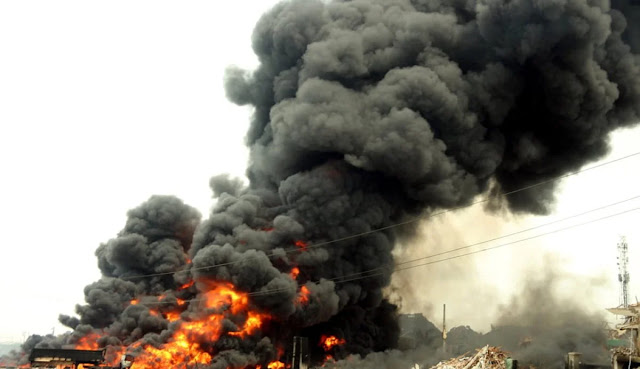A catastrophic explosion tore through Rivers State on the night of March 17, 2025, amplifying the region’s already volatile political and security landscape. The blast, which struck the Trans-Niger Pipeline in the Bodo community of Gokana Local Government Area, has plunged Nigeria’s oil-rich Niger Delta into further uncertainty. Occurring amidst an escalating political crisis, the incident has raised fears of sabotage, environmental ruin, and economic fallout, with the flames still raging as of early March 19, 2025.
The Blast: What Happened?
The explosion targeted the Trans-Niger Pipeline, a vital conduit that channels crude oil from Rivers State to the Bonny Export Terminal. The detonation, reported late Monday night near the under-construction Bodo-Bonny Road, unleashed a ferocious fire that has since spread into the surrounding mangrove forests. Thick plumes of black smoke have darkened the sky, visible from miles away, while the intense blaze has complicated efforts to assess the damage or extinguish it.
Eyewitnesses described a thunderous boom that shook the ground, followed by a rapidly escalating inferno. The pipeline, previously managed by Shell Petroleum Development Company before its transfer to the Aiteo Group, is a cornerstone of Nigeria’s oil infrastructure, transporting up to 245,000 barrels of crude daily. The incident’s timing—just hours before military forces seized control of the Rivers State Government House—has fueled speculation about its connection to the region’s political upheaval.
A Political Powder Keg
Rivers State has been teetering on the edge of chaos for weeks, caught in a bitter power struggle between Governor Siminalayi Fubara and his predecessor, Nyesom Wike, now the Federal Capital Territory Minister. The conflict intensified when the Rivers State House of Assembly, aligned with Wike, threatened to impeach Fubara over alleged misconduct. In retaliation, militant groups warned of attacks on oil installations if the impeachment proceeded, citing the federal government’s withholding of state funds as further provocation.
The explosion came mere days after these threats, prompting President Bola Tinubu to declare a state of emergency on March 18, 2025. This led to the suspension of both Fubara and the state lawmakers for six months, with Admiral Ibokette Ibas appointed as administrator. The military’s subsequent takeover of the Government House in Port Harcourt has only heightened tensions, with Fubara’s whereabouts still unknown as of this writing.
Sabotage or Accident?
Authorities have yet to pinpoint the explosion’s cause, but suspicion is rife. The Rivers State Police Command, led by spokesperson SP Grace Iringe-Koko, has launched an investigation, with early efforts focused on determining whether the blast resulted from human interference or technical failure. The pipeline’s history of vulnerability—over 460 illegal tapping points were dismantled in a single year—lends credence to theories of vandalism or oil bunkering gone wrong. However, the political context has led many to suspect sabotage tied to the ongoing crisis.
Local voices on social media have pointed fingers at various factions, with some alleging that the explosion was a calculated move to justify the state of emergency. Others argue it reflects the desperation of militant groups or political actors seeking to destabilize the region. Without official confirmation, these claims remain speculative, but they underscore the deep mistrust permeating Rivers State.
Economic and Environmental Fallout
The explosion’s repercussions could be staggering. Nigeria, Africa’s largest oil producer, relies heavily on the Niger Delta for its crude exports, which constitute over 80% of its foreign exchange earnings. The Trans-Niger Pipeline’s disruption threatens daily losses in the millions, with Brent crude prices hovering at $71.45 per barrel as of March 19, 2025. For a nation already battling economic headwinds, including a 70% currency devaluation since 2023, this setback could derail budget projections aiming for 2.2 million barrels per day in 2025.
Environmentally, the blast is a disaster in the making. The Niger Delta’s fragile ecosystem, long battered by oil spills, now faces further devastation as the fire consumes mangrove forests critical to local biodiversity. Fishing and farming communities in Gokana and beyond brace for the fallout, with past spills serving as a grim reminder of the long-term damage ahead. Emergency response teams are on-site, but the fire’s ferocity has so far defied containment efforts.
A Region on Edge
The explosion has compounded an already dire situation in Rivers State. The military presence in Port Harcourt, coupled with Fubara’s absence and the political vacuum left by the suspended assembly, has left residents anxious and uncertain. Protests have erupted in parts of the state, with some demanding clarity on the governor’s fate and others decrying the federal government’s heavy-handed response.
Nationally, the incident has drawn scrutiny to President Tinubu’s administration. Critics argue that the state of emergency and military deployment risk escalating tensions rather than resolving them, while supporters insist it’s a necessary step to safeguard Nigeria’s oil lifeline. The appointment of Admiral Ibas, a former naval chief with experience combating Niger Delta militancy, suggests a focus on security, but his ability to navigate the political quagmire remains untested.
What Lies Ahead?
As of 08:01 AM WAT on March 19, 2025, the situation remains fluid. The joint investigation team, comprising regulators and security experts, is racing to uncover the explosion’s origins, while efforts to douse the fire continue. The federal government has promised a full briefing once preliminary findings emerge, but the lack of immediate answers has only deepened public unease.
For Rivers State, this explosion is more than a physical disaster—it’s a symbol of a broader crisis threatening to unravel the region. Whether driven by politics, greed, or neglect, its impact will reverberate across Nigeria, testing the resilience of its economy, environment, and governance. Keywords like “Rivers explosion,” “Trans-Niger Pipeline,” and “Nigeria political crisis” are trending as the nation watches this unfolding drama, awaiting clarity amid the chaos.


Post a Comment
0Comments